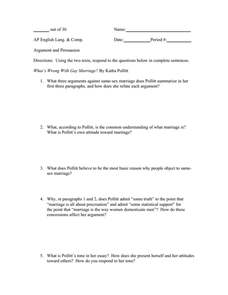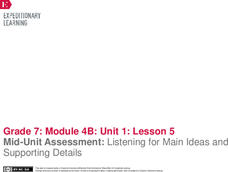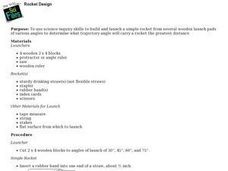Houghton Mifflin Harcourt
Customary Units of Capacity - Problem Solving 12.3
Math majors need not only to be able to solve problems, but also apply the skills to real-world situations. On this activity, they solve five problems in which they must convert units of capacity or liquid volume. Give this to your class...
Curated OER
The Last Word: Using Critical Thinking and Analysis to Reach a Decision
Want to explore the process of writing a persuasive essay and tie it in with the upcoming elections? Class members use Venn diagrams and the hamburger model of persuasive writing to write a five-paragraph essay on elections and...
Curated OER
Understanding Plagiarism--Worksheet 1
Understanding plagiarism is the goal of this worksheet. After reading the two definitions of plagiarism listed on the sheet, class members decide whether the eight listed scenarios constitute plagiarism. Their responses are used to...
Curated OER
Parts of the Plot: Constructing A Plot Diagram
After reading "The King of Mazy May" by Jack London, learners reinforce their literary analysis skills in this SMART board lesson. The provided SMART board file allows themto define elements of a short story, and then add it to the plot...
Curated OER
What This Cruel War Was Over: Slavery and the Civil War
Can't travel to Richmond for your Civil War unit? This plan creates an authentic experience, using primary sources and the essential question: Over What Was the Civil War Fought? Historians examine the Appomattox Marker, the site of Gen....
Curated OER
Bats
Use Stellaluna by Janell Canon to discuss bats and other types of animals. Learners identify the differences between bats and birds, list the traits of mammals, create a Bat Facts game, and go on a written scavenger hunt. Fun,...
Curated OER
Introduction to Legal Citation
A good resource for law students who need some help with citation, this presentation covers many key points from the ALWD Citation Manual. The nuances of legal citation, such as typeface, numbers, and primary sources, will become...
Florida Center for Reading Research
Phonological Awareness: Phoneme Blending, What's My Word?
At a listening station, learners listen to a pre-recorded script; they follow the directions and number each picture on their picture chart corresponding to the segmented phonemes they hear.
Florida Center for Reading Research
Phonological Awareness: Phoneme Isolating, Final Phoneme Find
This phonics activity engages listening skills and concentration. Young scholars listen to a teacher-made recording and use the provided worksheet to number the final phonemes they hear.
Curated OER
Argument and Persuasion: What's Wrong With Gay Marriage?
The topic of gay marriage has gotten lots of attention recently. Without actually asking your class their personal opinions, this two-page learning exercise has pupils study two essays about gay marriage. Readers analyze the attitude,...
Curated OER
Sun and Shadows
Why do shadows look different in the summer than in the winter? What causes day and night? How can a sundial be used to tell time? Answer these questions and more through two engaging lessons about light and shadows. Fourth and fifth...
Curated OER
Ordinary People: Anticipation Guide
Activate your pupils' thinking before reading chapter five of Ordinary People. Learners decide whether they agree or disagree with six statements and discuss their ideas in small groups. They then read chapter five and determine...
Curated OER
Tangerine: Anticipation Guide
Encourage your readers to make predictions about Edward Bloor's young adult novel, Tangerine, with an anticipation guide that presents statements that introduce key issues in the novel.
Curated OER
Object Pronouns
Work on replacing the object of a sentence with object pronouns. A handy grammar worksheet prompts language arts learners to read 20 sentences and choose the correct pronoun to fill in the blank from the word box above.
Museum of Tolerance
Oral History Activity
Oral history has brought a multitude of lessons, stories, and factoids to our current knowledge of the past. Let us continue to use oral history traditions through a lesson that encourages pupils to discover and appreciate...
Museum of Tolerance
Artifact Research Activity
Artifacts give us the privilege of learning about the past, may it be family, culture, or traditions. Here, class members learn about their family's past with the help of an artifact, or family heirloom. Once an artifact is...
C-SPAN
Polling and Public Opinion
Most people are eager to offer their opinions about topics of interest, but what's the most effective way to collect and assess these opinions as a matter of fact? High schoolers learn about the history of polling, as well as the...
Star Wars in the Classroom
"Shakespeare and Star Wars": Lesson Plan Day 6
How can a screenplay create meaning and drama in ways that other forms of writing cannot? That is the question class members must answer as they compare the cantina scene of the screenplay for George Lucas's Star Wars: A New Hope...
Cornell University
Light Waves: Grades 9-12
Explore the behavior of light waves with a lab activity. Scholars build new vocabulary through experimentation and observation. Using different mediums, they model reflection, refraction, transmission, diffusion, and scattering of light.
Digital Writing and Research Lab's – Lesson Plans
Teaching Close Reading through Short Composition/Revision
This activity may have writers evaluate short compositions, but their subjects are quite tall: great Americans. Pupils read one another's compositions and closely examine how specific phrases and diction contribute to shaping American...
EngageNY
Mid-Unit Assessment: Listening for Main Ideas and Supporting Details
Pay attention! Scholars view the video"Why College Students Should Start Paying Attention to Water" multiple times to complete a note catcher. After discussing their thoughts with the class, learners watch "The Water Crisis Isn’t...
American Museum of Natural History
Silk Road Fables
Talk about rabbit holes! With just this one resource, learners can travel the Silk Road listening to fables, meet a scientist who studies poisons (and whose favorite book is Alice in Wonderland), and listen to a video interview of an...
American Museum of Natural History
Cosmic Cookies
Scholars read about each planet then bake a plate of cosmic cookies—no-bake cookies decorated to look like the planets; Mercury, Venus, Earth, Mars, Jupiter, Saturn, Uranus, Neptune, and Pluto.
Curated OER
Rocket Design: Aerodynamics, Trajectories
Students use science inquiry skills to build and launch a simple rocket, from several wooden launch pads of various angles, to determine what trajectory angle carry a rocket the greatest distance.

























